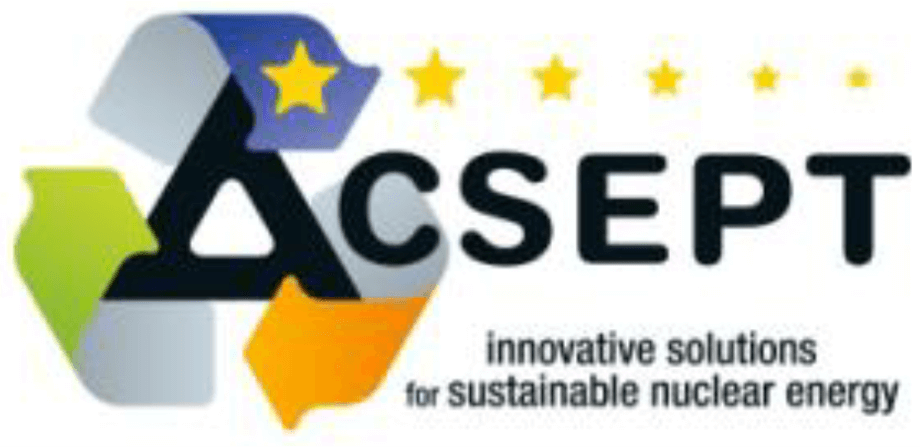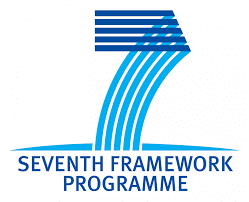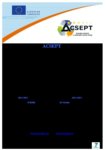ACSEPT: Actinide reCycling by SEParation and Transmutation
ACSEPT (Actinide reCycling by SEParation and Transmutation) was a four and a half year EU-funded research project focused on the development of actinide partitioning technologies for spent nuclear fuels. The developed partitioning methods are ultimately intended to form part of a closed nuclear fuel cycle which incorporates the transmutation of actinides.
Overview
Project Dates: 01/03/2008 – 30/09/2012
Project Status: Closed
Website: http://www.acsept.org/ (now taken down)
Minor Actinides (MA), particularly americium, curium and californium, contribute significantly to the long-term radiotoxic inventory of most spent nuclear fuels. The quantity of material that must be committed to a geological disposal facility might be substantially reduced or consolidated by partitioning the minor actinides and treating them separately. Partitioned minor actinides could subsequently be transmuted into short-lived or stable nuclides (the Partition and Transmute or P&T strategy) or conditioned into a stable matrix (the Partition and Condition or P&C strategy).
The focus of ACSEPT was on the development of partitioning methods for potential future P&T or P&C processes. It continued much of the research of the earlier EUROPART project.
ACSEPT developed or elaborated a number of core partitioning processes in the domains of hydrometallurgy and pyrometallurgy and increased understanding of relevant fundamental mechanisms. ACSEPT also further developed supporting and ancillary processes such as the conversion of spent fuel into suitable treatment form and the recycling and conditioning of secondary wastes. Cross-cutting work promoted education, training and dissemination and interfaced with other EU programmes such as ASGARD and FAIRFUELS to ensure alignment of the R&D of both the ‘partitioning’ and ‘transmutation’ steps of a P&T process.
Objective
The overall objective of the ACSEPT project was to develop chemical separation processes for actinides in spent nuclear fuels to support the development of advanced fuel cycles.
ACSEPT is organised into three technical domains, each of which had different development goals:
- Hydrometallurgy, considering technically mature aqueous separation processes for minor actinides (Am and Cm), ACSEPT aimed to optimise the most promising. The selected separation processes for optimisation in this project were:
- lc-SANEX process, extraction of Am(III) and Cm(III) directly from PUREX raffinate.
- i-SANEX process, co-extraction of actinides(III) and lanthanides(III) from PUREX raffinate in a DIAMEX-like process, followed by selective back extraction of An(III).
- GANEX process, development of a processes for co-managing (extracting) all transuranium elements (TRU = Np, Pu, Am, Cm), thereby avoiding pure Pu products.
- Pyrometallurgy, concerning high temperature pyrochemical separation processes, ACSEPT focused on the enhancement of the two reference cores of process selected in the previous EUROPART project, and aimed at the validation of the scientific feasibility of each technological ‘brick’ at the lab scale. The core processes were:
- Electrorefining of actinides onto a solid aluminium cathode in molten chloride salts.
- Liquid-liquid reductive extraction in molten fluoride salts/liquid aluminium.
- Process, the aim of the third technical domain of ACSPET was to develop the engineering requirements for the implementation of partitioning and transmutation into the nuclear fuel cycle, in particular developing a pilot plant concept. This entailed undertaking engineering and systems studies of the hydro- and pyrochemical processes studied in the other two domains. In addition, ACSEPT aimed to support and collaborate with other EU P&T focused projects including the FAIRFUELS and ASGARD projects.
In addition, and cutting across all technical domains, the ACSEPT project included a training and education programme, with the aims of:
- sharing knowledge among communities, including both present and future generations;
- encouraging interest in entering the field of nuclear research; and,
- maintaining nuclear expertise in Europe.
Results
The achievements and results of the ACSEPT project can be broken down by their respective technical domains:
- The main results and technical achievements of the hydrometallurgy technical domain were:
- Knowledge of dissolution chemistry of (unirradiated) bulk-phase MOx was improved through experimental and mechanistic studies. This is vital for the development of ‘Head End’ steps (operations taking place ahead of the core of processes) for advanced fuel reprocessing.
- More then 120 new molecules were synthesised and screened for their potential ability to be used in one the aqueous processes.
- New and known molecules which passed screening criteria were further studied, in order to collect the data necessary for designing a separation process, with a focus on the 1c-SANEX, i-SANEX and GANEX processes. This included determining relevant equilibrium and kinetic data, investigating stability, calculating flowsheets and, finally, performing counter-current process tests, including hot tests with active material.
- Studies were undertaken to demonstrate the fabrication of UO2 fuel elements containing trivalent actinides (for potential Gen IV reactors). U/Pu and U/Am microspheres were successfully fabricated and characterised.
- The main results and technical achievements of the pyrometallurgy technical domain were:
- Development of ‘Head End’ steps for pyrometallurgical processes, focused on the conversion of spent fuel into metal or fluorides. Inductive Vaporization was explored as a pre-treatment to remove short lived fission products. Direct electrochemical reduction processes for converting fuel oxides into metal were investigated in Chloride and (for the first time) in Fluoride salts. The feasibility of hydrofluorination to convert oxide fuel into fluoride was also assessed
- A number of pyrochemical processes for the separation of actinides developed or elaborated. Specific topics studied were: the evaluation of the electrochemical processes occurring in chlorides and molten fluorides, the definition and lab-scale demonstration of a process for recovery of An from An-Al alloys, the validation of efficiency of reductive extraction in molten chlorides, and alternative electrochemical process in fluorides using liquid metal dropping electrode.
- Techniques for the recycling of the salts used in pyrochemical processes were evaluated. For chloride salts ACSEPT investigated zeolite ion-exchange, aqueous dissolution and ion-exchange, precipitation using gaseous reagents, and electrolysis as decontamination technologies. Exploratory studies were also undertaken into the speciation and transport properties of fission products in molten salts and the use of distillation as a decontamination method.
- Assessments of sodalite and chlorapatite as matrices for conditioning chloride salts for disposal were undertaken. Metallic matrices were investigated for conditioning metallic fission products.
- The main results and technical achievements of the Process technical domain were:
- System studies and flow sheet evaluations were undertaken for a number of fuel cycle concepts incorporating P&T.
- The technological gaps preventing development of a pilot plant for MA separation were identified.
- A range of experimental studies were undertaken focused on the integration of science and engineering in three main domains: process operation and monitoring, corrosion issues and scale-up studies.
- Work was undertaken to address potential missing links between the R&D on partitioning on the one hand and on transmutation on the other hand. A feasibility study was undertaken for the proposed fuel pellets for the MARIOS experiment within the FAIRFUELS project. In addition, reprocessing options for different MA bearing fuel matrices were investigated.
Many of the successes and recommendations of the ACSEPT project were subsequently taken forward in the research programmes of the ASGARD and FAIRFUELS projects.
The ACSEPT project also achieved its training and education goals by funding fellowships for mobility and transnational collaboration, holding workshops and training sessions, and promoting the visibility of the project online and at conferences.




